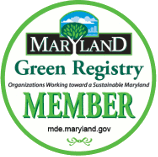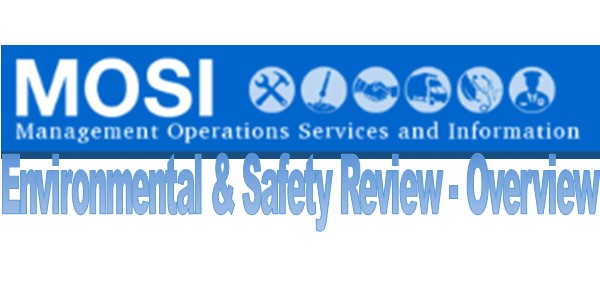FAQs
- Animal Control
- Drinking Water
- Greenhouse Gas Emissions
- Hazardous and Universal Wastes
- New Projects and Environmental Reviews
- Recycling and Affirmative Procurement
- Stormwater / Construction Permits
- Stormwater Management at GSFC
- Potable (Domestic) Water Discharges
- Tanks/Oil Storage
Animal Control
Who do I call for dangerous, annoying, dead or dying animals?
You should contact the Goddard Protective Services Division. For non-life threatening incidents call (301) 286-8661. If it is an emergency, utilize the Center's 911 procedures or (301) 286-9111.
Drinking Water
What do I do if I have a question about sinks or water fountains?
Visit the Center's drinking water page for information about drinking water at Goddard.
Greenhouse Gas Emissions
I've heard Goddard completed inventories for Scope I, Scope II and Scope III emissions. What are these?
Goddard has completed inventories for Scope I and Scope II greenhouse gas (GHG) emissions. Executive Order (EO) 13514 requires Federal agencies to establish absolute GHG reduction goals for Scope I and II GHG emissions (90 days after issuance of EO) and Scope III emissions (240 days after issuance of EO) using a baseline year of FY2008 and a target year of FY2020.
Scope I emissions include all direct emissions, such as fuel combustion, chemical processing, transportation of materials, products and employees, and fugitive emissions.
Scope II emissions include those from the generation of purchased electricity.
Scope III emissions include indirect emissions from sources, such as business travel, employee commuting, and contractor-owned vehicles.
Hazardous and Universal Wastes
What is a hazardous waste?
Hazardous waste is a waste with properties that make it dangerous or potentially harmful to human health or the environment. It is regulated under the Resource Conservation and Recovery Act (RCRA) Subtitle C. In regulatory terms, a RCRA hazardous waste is a waste that appears on one of the four hazardous wastes lists (F-list, K-list, P-list, or U-list), or exhibits at least one of four characteristics—ignitability, corrosivity, reactivity, or toxicity.
How do I dispose of hazardous waste?
If a hazardous or universal waste pick-up is required, the requestor should submit a ticket using the Management Operations Services and Information (MOSI) Portal system. For more information please contact Lixa Rodriguez-Ramón at x6-4613.
How long does it take for a hazardous waste container to be picked up?
Please allow three business days for your waste to be picked-up. In case of inclement weather we might have to reschedule. If you do not have a waste stream number, we need additional time to analyze your waste and create the waste stream ID number before we can pick up your waste.
Where can I find more information about Goddard’s hazardous waste management requirements?
- Call extensions 6-9233, 6-4613, or 6-8874
- See GPR 8500.3, Waste Management
- See the hazardous waste section of this website
- Read your waste generator notebook
What is universal waste?
Universal wastes are hazardous wastes that are subject to less stringent regulations. The universal waste regulations streamline collection and management requirements for certain widely-generated hazardous wastes to facilitate environmentally sound collection and proper recycling or treatment. Universal wastes include the following categories:
- Batteries
- Pesticides
- Mercury-containing equipment (e.g., thermostats) and lamps (e.g., fluorescent bulbs)
New Projects and Environmental Reviews
I am planning to initiate a facilities project. How do I find out if environmental requirements apply?
Project managers/planners/leads are required to submit their projects for review via the on-line Environmental and Safety Review (E&SR) in the Management Operations Services and Information (MOSI) system.
The E&SR engages Code 250 and 360/391 personnel to review and identify environmental and safety requirements for the project.
Access the MOSI E&SR Process here.
Click here for an overview of the E&SR Process.
Recycling and Affirmative Procurement
Where can I find more information about recycling services at GSFC?
Visit recycle.gsfc.nasa.gov for information about recycling services and points of contact.
How do I request a waiver from recycled content items or biobased items?
You can read more about affirmative procurement guidance.
Stormwater / Construction Permits
When is a permit required for Stormwater Associated with Construction Activity?
- Required when planning a construction project in Maryland AND the overall project will disturb one acre or more of earth.
- Regulatory citation: (Federal) Clean Water Act Section 402 and the Code of Federal Regulations (40 CFR 122.26) and (State) Environment Article, Title 9, Subtitle 3, COMAR 26.08.04
- An erosion/sediment control plan approval must be obtained prior to obtaining a permit for construction activity
- MDE's standard turnaround time to issue the general permit is 45 days
- Forms are available through MDE’s Website.
For more information, see the General Permit for Stormwater Associated with Construction Activity.
What are the required Erosion/Sediment Control and Stormwater Management Plan Approvals?
- Required when disturbing 5,000 square feet or more or 100 cubic yards or more of earth OR the project impacts an existing storm water management facility
- Erosion / sediment control approval required before construction activity that disturbs 5,000 square feet or more of soil, or results in the excavation of 100 cubic yards or more of soil
- Stormwater Management Plan approval required for any new development project that disturbs 5,000 square feet or more of land. Approval can be obtained at the same time as the erosion and sediment control approval.
Please review a flow chart of the GSFC and State stormwater management plan and erosion/sediment control approval process.
- Regulatory citation: (State) Environment Article, Title 4, Subtitle 1 for erosion and sediment control and Subtitle 2 for stormwater management. These statutes are further defined in COMAR 26.17.01 and 26.17.02.
- Maryland Department of the Environment's (MDE) approval process is six months.
- Forms are available through MDE's Website.
For more information, see MDE's Erosion and Sediment Control page.
Stormwater Management at GSFC
Visit our storm water management for more information.
Potable (Domestic) Water Discharges
I have an activity that requires the use of potable (or domestic) water outside. Can I just let this flow into a storm drain?
No. GSFC operates under several National Pollutant Discharge Elimination System (NPDES) permits administered by the State of Maryland that govern discharges of potable and other source water to the storm sewer system. In addition, GSFC has its own Storm Water Pollution Prevention Plan (SWPPP) that prescribes best management practices to comply with federal and state stormwater regulations.
If you have an activity that will result in a discharge of potable (domestic) water that may enter the storm sewer system, contact the MEMD to determine the potential regulatory requirements and management practices. Examples of activities include, but are not limited to, power washing, flushing domestic water distribution lines or fire control systems, or accidental releases from water distribution line breaks. Please see the flow chart "General Permit Requirements for Stormwater Discharges from Water Utilities and Fire Control Systems" for more information. When in doubt about how to manage the water, please contact the MEMD at 6-6741. The MEMD performs all notifications to regulatory authorities.
Why does it matter? It's just clean water.
Potable water is good for us to drink, but can harm aquatic life because it contains chlorine. Chlorine can interrupt biological processes of aquatic life by killing beneficial bacteria. Additionally, some activities have the potential to cause erosion when discharging water at high rates and/or volumes.
Tanks/Oil Storage
What are the requirements for oil storage tanks, generator sets, aboveground storage tanks, drums, and transformers?
All oil storage tanks, generator sets, aboveground storage tanks, drums, and transformers with a storage (shell) capacity of 55-gallons or greater shall comply with GSFC's Integrated Contingency Plan (ICP). If you are bringing a new oil storage tank onsite, even temporarily, notify the Medical and Environmental Management Division, to ensure compliance,
Specifically, all oil storage tanks with a shell capacity ≥55 gallons shall include:
- Secondary containment in the form of a double-walled tank or diked area (containment pallet for drums)
- Capacity must be the volume of the largest single tank within the diked area with sufficient freeboard for precipitation (outdoor containment only).
- Secondary containment must be kept clean and drained in accordance with GSFC’s ICP
- A method to monitor the interstitial space for double-walled tanks.
- A high-level alarm or other approved overfill protection device that can be seen by the operator filling the tank if fueling operations take place.
- Tank filling operations must be performed in accordance with procedures outlined in Appendix N of GSFC's ICP.
- Tank gauge (preferably clock type).
- Normal (Atmospheric) Venting pursuant to the current NFPA 30 Standard.
- Emergency Venting pursuant to the current NFPA 30 Standard.
- Labeling to indicate
- Tank contents
- Tank capacity
- Tank ID
- Fire Hazard (NFPA diamond)
- Labeling should be placed on the side of the tank visible to emergency responders approaching the tank
- Labeling should be large enough for responders to readily identify tank contents
- Spill Kit within the immediate area of the tank.
- A logbook to record monthly inspections.
- Adequate lighting for the detection of spills at night.
Also, per GPR 8500.5, all oil containers with a volume (shell) capacity of 55 gallons or greater must comply with GSFC’s ICP, industry standards, and all state, federal, and local laws. New tanks will be placed under Environmental Administrative Lockout/Tagout until these requirements are met.
MEMD regularly inspects storage tanks to ensure continuous compliance with training, housekeeping, structural, and inspection requirements. Specific procedures and guidelines for bulk fuel transfers, tank monitoring and inspection, and spill reporting are outlined in GSFC’s ICP. All forms necessary are contained within the appendices of the most current version of GSFC’s ICP.
Oil products shall be handled in a manner to prevent releases to the environment. All oil handlers, supervisors of oil handlers, and responders must complete GSFC ICP training on an annual basis.





